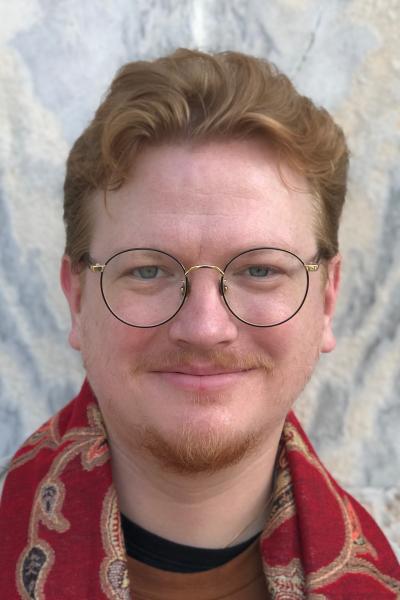Gustav Zamore
Researcher at Department of History
- Telephone:
- +46 18 471 77 41
- E-mail:
- gustav.zamore@uu.se
- Visiting address:
- Engelska parken, Thunbergsvägen 3 A
- Postal address:
- Box 628
751 26 UPPSALA
Download contact information for Gustav Zamore at Department of History
- ORCID:
- 0000-0002-7699-2478
More information is available to staff who log in.
Short presentation
Researcher in History, funded by the Royal Swedish Academy of Letters, History and Antiquities.
My research interests lie in the religious culture, broadly defined, of the High and Late European Middle Ages and questions of authority, conscience, and dissent. My current project considers how medieval sacred spaces were used as an arena for protest and social action and how the symbolic repertoire of sacred space was harnessed to articlate dissent and discontent.
Biography
Education:
D.Phil., History, University of Oxford, 2017.
MSt, Medieval Studies, University of Oxford, 2012.
MA, Latin, Uppsala University, 2011.
BA, Latin, Uppsala University, 2010 (with studies in Theology, History of Science and Ideas, and Classical Greek).
Current Positions:
Academy Research Fellow (Akademiforskare), Uppsala University 2023-
Associate Fellow, Clare Hall, University of Cambridge, 2023-
Associate Researcher, Faculty of History, University of Cambridge, 2023-
Previous positions:
Marie Skłodowska-Curie Individual Fellow, Faculty of History, University of Cambridge, 2021-2023
Research Fellow in the Arts, Humanities and Social Sciences, Clare Hall, University of Cambridge 2021-2023
Guest Researcher, Stockholm University, 2018-2021.
Secretary, Centre for Medieval Studies, Stockholm University, 2019-2020.
Prior to returning home and to my alma mater, I was engaged in a two-year postdoctoral fellowship in Cambridge, funded by the European Research Council, and based at the Faculty of History and Clare Hall, where I also served on the college’s Governing Body and Council.
I completed my doctorate at the University of Oxford (Merton College) in 2017 with the thesis ‘The Term Synderesis and its Transformations: A Conceptual History of Synderesis, ca. 1150-1450’ under the supervision of Prof Lesley Smith. Prior to this, I had completed a Master of Studies programme in Medieval Studies at Balliol College, University of Oxford in 2012.
Following a career break in 2017 due to family reasons, I was between January 2018 and August 2021 a researcher at the Department of History and the Centre for Medieval Studies at Stockholm University and was between March 2019 and June 2020 the Secretary of the Centre, working with the Director, Prof Kurt Villads Jensen.
Research
My project examines how Christian sacred spaces—churches, chapels, shrines, and processions—and the repertoire of symbols, gestures, and material culture they offered were used to articulate dissent and discontent in various forms of protests and social actions.
Sacred spaces, understood as places defined by a set of ritual and social practices following Michel de Certeau’s definition of space as a ‘practiced place’, played a central role in high and late medieval society. Although nominally separate from mundane ones, sacred spaces were deeply embedded in structures of power and therefore also important arenas for social conflict. Sacred space and its defining rituals could on the one hand establish communal identities and promote social cohesion in a stratified society riddled with social tensions, but could also provide a resource when such tensions came to the fore.
The most recent authoritative research on medieval revolt has argued against seeing revolt as imbued with religiosity. This project, by contrast, reframes the relationship between popular protest and religion by arguing that sacred space played a role in revolts, and, more importantly, in everyday forms of protest. This spatial aspect of medieval social life and religious culture is crucial for understanding how people in the Middle Ages, and in particular the majority of the church–the laity–understood, protested, and negotiated their place in society.
My project will expand on my research as a Marie Skłodowska-Curie Action Individual Fellow (MSCA-IF) at the University of Cambridge in studying the uses of sacred spaces to contest ecclesiastical authority in high and late medieval Europe. The project will further expand and use a database of cases that I have created through extensive research on medieval episcopal registers, inquisition depositions, chronicles, and other narrative sources.
I am also engaged in a number of short-term projects in developing themes from my doctoral thesis. A central concern is the implications of the development of a moral-psychological discourse in the early thirteenth century on perceptions of heresy and how the concepts of scholastic moral psychology were translated into the vernacular and communicated to a non-academic public.

